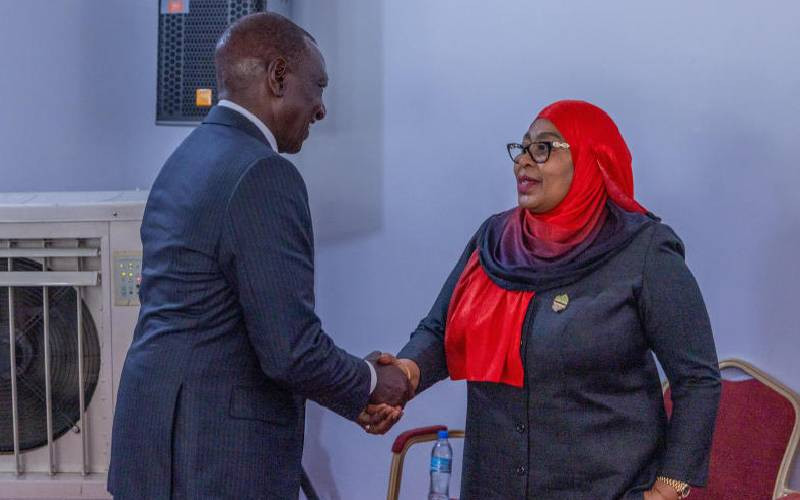There are moments in a nation’s life when it must choose between appearing strong and being wise. President Samia Suluhu’s recent decision to bar foreigners from operating small and medium-sized businesses in Tanzania is one such moment.
As a people living along a border drawn by colonial hands, we have long understood that economic reality is often more powerful than political decree. The livelihoods of border communities are interwoven by shared language, customs, bloodlines, and daily trade. We trade not as citizens of separate states, but as one people connected by history and necessity. Our cattle cross the hills without papers, our bananas follow the shortest route to market, and our children learn Kiswahili before they understand why their birth certificate carries one flag instead of another.
That is why the directive from Dodoma cuts deeply, not just into our sense of fairness, but into the very flow of life in our region. It threatens to arrest a centuries old current of commerce and cooperation under the illusion of national protection.
The rationale may seem familiar. Some decades ago, President Julius Nyerere led Tanzania down a similar path of economic nationalism. In pursuit of Ujamaa, foreign businesses and private capital were seen as impediments to national sovereignty. Swahili was weaponised not just as a unifier of people, but as a tool for economic enclosure. Tanzania told herself that it could build an economy based purely on its own people, its own language, and its own strength.
Follow The Standard
channel
on WhatsApp
But history offers its verdict. By the early 1980s, Tanzania’s economy had slowed to a crawl. The rural poor grew poorer, inflation ballooned, and the nation was forced to welcome back the same external capital and cross-border trade it had once rejected. The very ideology that promised self-reliance became unsustainable when it became clear that markets and capital cannot be created by decree. They must be cultivated through openness, cooperation, and trust.
Suluhu’s recent directive echoes that same fallacy. It assumes that foreign SMEs are a threat to Tanzanian enterprise rather than a vital part of its survival. It overlooks that many of these “foreigners” especially those operating near border towns are in fact long standing neighbours, trading partners, and even extended family to the local communities. It disregards the foundational economic truth that markets need buyers, not just sellers, and that buyers with capital whatever their passport are a lifeline, not a liability.
The measure also fails to grasp the danger of domestic surpluses without external demand. The moment you drive out the very people who buy your maize, bananas, rice and charcoal in bulk because they operate SMEs, you begin to suffocate your own producers. Surplus becomes waste. Prices drop. Farmers lose income. Traders abandon the business. And economic activity begins to shrink.
Moreover, foreigners especially those engaged in SME level trade tend to bring stronger cash flows, capital with higher currency value, and linkages to wider markets. They inject liquidity, diversify supply chains, and sustain informal employment. Banning them may offer a short-lived sense of national assertiveness, but the long-term effect will be fewer jobs, smaller markets, and lower demand.
From Kehancha on the Kenyan side, we are already seeing early tremors. Farmers who sell livestock or horticulture across the border face uncertainty. Tanzanian businesses that depend on suppliers from Migori and Kisii are likely to stall. Families that earn their living by straddling the border will be watching that bridge crumble, not due to war or disease, but due to policy.
To the Kenyan government, this is a moment to respond not in kind, but with clarity. Retaliating with similar restrictions will hurt our economy more than it punishes Tanzania. Fewer foreign traders would mean fewer buyers and lower prices, giving undue bargaining power to a smaller pool of consumers. That is not economic leadership; it is self-sabotage.
Instead, Kenya should seize this moment to become the more attractive economic partner. Lower import duties for goods from Tanzania that face less competition now. Giving incentives for imports from Tanzania’s competitors especially for goods similar to those produced in Tanzania would be seen as payback for her decision, but it may, in the long term, undermine the cohesion of the East African Community. It would be wise to offer incentives for foreign-owned businesses that may be looking for relocation options. And most importantly, stand firmly with the border communities whose economic future depends on openness, not hostility.
This is not just a local issue. It is an East African issue. If one member of the EAC begins closing economic doors, others must open windows lest the whole house suffocates.
In times of tension, it is tempting for nations to turn inward. But history, including our own regional experience, reminds us that prosperity comes not from exclusion, but from cooperation. Suluhu may believe this ban protects Tanzania’s soul. But I fear it will wound her body, her economy, and her people.
And as a Kenyan, I remind our leaders on both sides of the border: We may be divided by colonial lines, but our livelihoods are united by necessity. Let us not kill the market to protect the trader. Let us not punish partnership in the name of politics.
Let Tanzania not repeat the pain of economic experiments past. Let Kenya choose a wiser path. And let the locals, who live between these two homes, continue to trade, thrive, and testify to what East Africa can become when it chooses reason over rhetoric.
Follow The Standard
channel
on WhatsApp
By Nokwi Maroa
